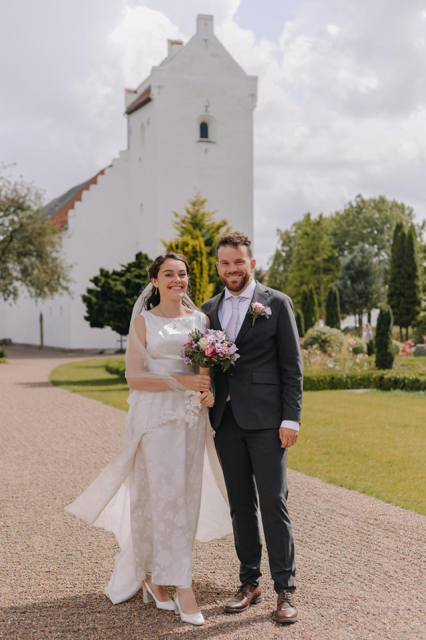MEGAN and Matthias Jensen married on August 10, 2024 but, over a year on, they are still battling to be allowed to remain in Britain, Megan’s country of birth.
In a letter to the Tenby Observer and also for the attention of local MP Henry Tufnell, Pembroke Dock resident Neil Hunter tells the story of his daughter and son-in-law’s frustration with the country’s immigration process.
“Our political status in the UK is in total melt down,” the letter begins. “Our borders are being breached every day by individuals who hold no allegiance to this country and people generally are living in a state of fear for tomorrow. The government like our failing fishing industry has too many important statehood matters, lost through torn nets and pointless rhetoric and often under this avalanche of broken promises and false ideals, basic rights are lost.”
Neil writes: “Two years ago Megan (my number 4 child) was struggling to establish herself on the job market. She’s a strong girl and rather determined but one of the many who unfortunately was doing her degree during the COVID years. Post COVID as we all know is a very different place to pre-COVID: people lost something during those years and Britain’s optimism and purpose changed. The state became more invasive, more intolerant of people’s ideals and human rights were sacrificed under the umbrella of safety.
“Today, of course, we all know what a nonsense that all was - the false claims, the distorted figures, the lies. Unfortunately, what is left is a broken system stifled by layers of pointless bureaucracy.
“Megan post degree (2:1) was thrown into the job market and for two years sought to find solace in an endless road of job applications and temporary positions; this as you can imagine was a soul destroying task and Megan began to lose hope. Whilst living in Cardiff she attended a Baptist church and learnt of an opportunity in France and Spain to undertake a pilgrims’ walk – the Camino Santiago; it was some 500 miles and would take a number of weeks to complete.
“It was during this time that Megan met a Danish man who very quickly became her soulmate and later her husband. Matthias is a well educated stable man with his own property in Denmark. He wanted to be with his wife in the UK, but this is where it all becomes rather difficult, you see we are not in the EU anymore and certain factors need to be in place for that to happen.”
The factors may surprise you.
Megan has to prove an income in excess of £29,000 per year or
Megan has to have more than £80,000 in the bank for six months or more.
“Denmark, on the other hand, recognised the marriage and offered Megan a visa”, Neil continues.
“But here is the dilemma, Megan was a university student in Bristol for three years, she then did a Post-Graduate Certificate in Education (teaching). She feels indebted to the system and recently has been offered a job at a local school.”
Not only is the process of immigration proving costly, it’s also forcing a married couple to spend much time apart.
“She has now been married for 12 months and only lived with her husband for 50 per cent of the time, the rest of the time he has been in Denmark,” adds Neil.
“Megan has been employed by her uncle for the past six months, paid her stamp, tax and all contributions, her solicitor has been paid a fair chunk of money to oversee the process which could end up costing over £7,000.
“Her case has now been refused on the grounds that she was working for a relative and she is being forced into moving abroad to satisfy the UK rules.”
Neil concludes with the following argument: “Now we all know what’s happening to the illegal migrants - the ones who hate the UK and live in posh hotels - but is it fair that Megan should be thrown under the bus whilst those who spurn the law should be chauffeur driven to their private chambers?”
As Britain struggles to enforce its borders and discourage unauthorised immigration, Nigel Farage, leader of the Reform Party, recently outlined his plan to scrap indefinite leave to remain (ILR), throwing the lives of an estimated 430,000 legal migrants into uncertainty if the party comes to power - a scenario that has never looked more likely.
“Indefinite leave to remain is how most migrants settle in the UK, wherever they come from. It gives them the right to live, work and study in the country permanently, as well as access benefits where eligible,” explains an article in the Independent.
“In most cases, ILR can be applied for after five years of living and working in the UK,” says the article, adding that applicants may also need to meet certain salary or financial requirements, quoting figures that are much higher than the average UK salary.
“In May, Labour pledged to introduce tough new restrictions on ILR, meaning most applicants will need to be in the UK for 10 years before they can apply, as well as shortening the list of eligible jobs.
“Under Reform’s plans, this settled status would be scrapped – even for those currently residing in the UK on it.
“Instead, a new visa with far stricter requirements would need to be successfully applied for and renewed every five years.”
The article adds: “It would also see the rights and freedoms they enjoy restricted, as access to NHS services or benefits would be rescinded. The new visas would require advanced English, with strict new limits on partners and family members being able to join.”
It’s a worrying time for one local couple, who did not want to be named, but were happy for their story to be shared in the Tenby Observer. The husband, a British citizen working in a job benefitting the Pembrokeshire community, is married to a Filipino who works at Withybush Hospital. She has been in the UK nearly 10 years, working for the NHS. Originally her visa was tied to her job but now she has gone through the long legal process to get her ILR. The couple have a young daughter.
The couple are sympathetic to many of the principles that Reform stand for and they even agree that tighter controls need to made on immigration, so the husband and father wrote to Carmarthenshire Reform Councillor Michelle Beer of his concerns over the removal of ILR.
“This policy has the potential to split our family up,” he wrote.
“While I acknowledge that someone in [my wife’s] position is a strong one being married to a UK citizen, having a child who is a UK citizen, working in the NHS… there is still the moral question: [she] has earned her right to be here and this should not be taken away from her.”
The wife and mother can, of course, apply for her UK citizenship. “However, that is a difficult process,” the letter reasons: “she has to renounce her Filipino citizenship first.”
He finished by asking the councillor for reassurances for families like his - including “the many Christian families that have blessed our local churches with an influx” - who are “greatly concerned about these proposals.”
The Councillor’s response: “Reform propose to abolish indefinite leave to remain (ILR) and replace it with a new visa system requiring application. I believe, this change aims to reassess cases where ILR may have been granted without sufficient scrutiny.
“I believe families like yours would have no significant issues and would be issued smoothly,” she wrote, adding: “Hardworking families who add value to Britain are unlikely to be penalised.”
But she also wrote: “Reform’s key message is that Britain is not a charity; those who have not contributed or cannot contribute may face stricter measures, including deportation for foreign offenders or those failing the new visa criteria.”
Although a response has not yet been received from Henry Tufnell when he was contacted for comment, the Observer understands that a reply was sent to Mr Hunter regarding Megan and Mathias with an assurance that the MP will be looking into the situation.





Comments
This article has no comments yet. Be the first to leave a comment.